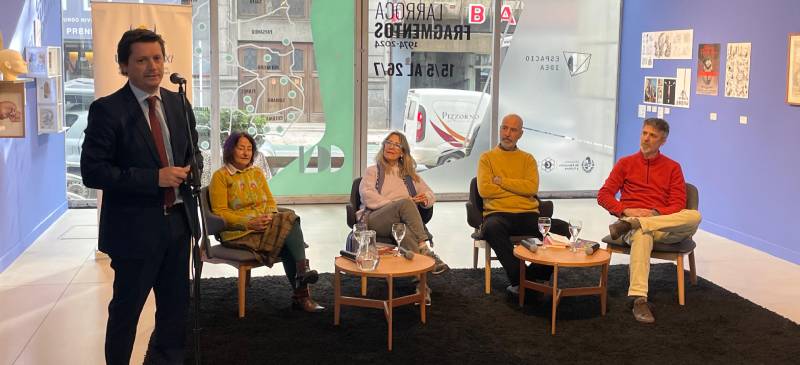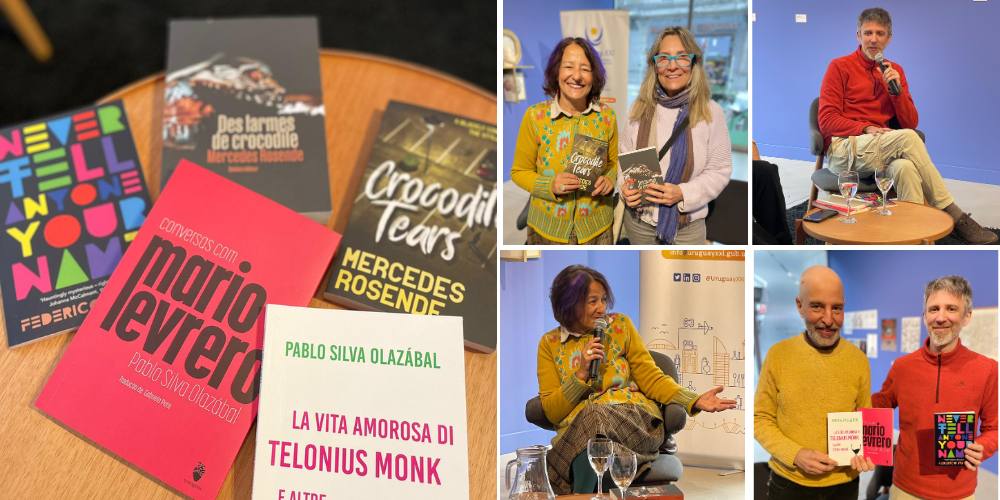- Home
- About us
- News
- Events
- EXPORT Export
-
BUY
Buy
Buy
- INVEST Invest
- COUNTRY BRAND Country Brand
-
INFORMATION CENTER
Information center
InformationCenterInformationCenterReports Country reports Department reports Foreign trade reports Product-Destination worksheet Sectors reports Work documentsStatistical information Classification Uruguay XXI Exports Imports Innovative National Effort Macroeconomic Monitor Tools Buyers Exporters Investors
- Contact
-
Languages
IDA Program propels Uruguayan literature to the global stage in its sixth edition
The initiative, which strengthens the presence of national authors in international markets, has translated more than 50 works into 11 languages
Share:

The IDA Program continues to promote Uruguayan literature in international markets. Its sixth edition, recently presented, seeks to strengthen the presence of national authors abroad and encourage the creation of audiobooks.
The program, coordinated by the investment, export, and country image promotion agency Uruguay XXI and the National Directorate of Culture of the Ministry of Education and Culture, aims to promote the export of Uruguayan literature by facilitating its translation. Both organizations presented the new edition with a table of national authors who shared their experience translating their work within the program’s framework.
“We are delighted that works by Uruguayan authors are translated into such diverse languages as this program has facilitated,” said the executive director of Uruguay XXI, Sebastián Risso, who underscored the importance of this type of initiative for the promotion of the country’s creative industries.
During the event, Mariana Wainstein, the national director of Culture, emphasized that culture has much to do with the country’s brand and image abroad. “We are working together so that our culture is truly recognized as an engine of development,” she said.
The IDA Program, which honors Uruguayan writer and translator Ida Vitale, has translated some 50 works into 11 languages since its creation in 2019. During the 2023 edition, 11 titles were translated, and an audiobook was produced.

At the launch of the sixth edition, a panel moderated by writer Pablo Silva Olazábal was held in which several beneficiary authors shared their experiences and highlighted the program’s positive impact on their careers. Federico Ivanier, whose book Nunca digas tu nombre was translated into English, valued the support that allowed him to publish his book in England. “It is a big market that is very difficult to enter because it is very saturated, and the work lasts very little time in the space. A small publishing house, in this context, needs all the help it can get to solve the translation,” she said.
Mercedes Rosende, whose work El miserere de los cocodrilos has been translated into English and French, emphasized how important it is for the arts to have the support of the State. “Somehow, it is becoming a state policy,” she said.
He also added that the effects of this type of program, although not immediate, are essential to project Uruguayan culture. “When a translation is done, a huge market is being given the possibility of having a writer, in this case, a Uruguayan writer, and each book translation can also lead to other translations,” she said.
The author of Don't Smoke or Go to War, Cecilia Ríos, told how her book was translated into Serbian thanks to a personal connection. Her book, initially edited by Banda Oriental, won the Narradores de la Banda Oriental award and was translated into Serbian into a path she described as “haphazard” in the sense that it had little to do with will. “You could say it started 14 years ago when I had gone to Serbia because my partner and his parents were from there,” he recounted. She happened to meet a person who took the trouble translating some of the stories in his first book and publishing them in magazines there. “She helped me publish a novel there, and when I saw this program, it seemed like a good way to give back to her,” he said.
“Having funds available makes it possible to give another diffusion to the book since the first one had been circumscribed to people in the world of literature translation,” Ríos evaluated.
Finally, Pablo Silva Olazábal, whose work The Love Life of Telorius Monk was translated into Italian and Conversations with Mario Levrero into Portuguese, highlighted the relevance of the program: “Culture is an export product. This program not only benefits culture, but it is vital to be in new markets”.
The IDA Program continues to consolidate itself as a crucial platform for the internationalization of Uruguayan literature. It strengthens the presence of national writers in the global literary scene and contributes to promoting Uruguayan culture abroad. Interested publishers and authors can learn about the rules of participation for the sixth edition here.
